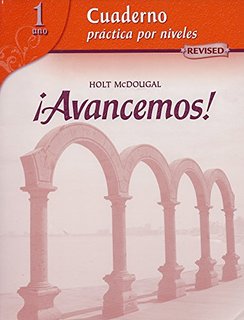
All Solutions
Page 51: Vocabulario B
The objective of this exercise is to practise Spanish vocabulary.
Six statements are given in this exercise. For each statement, you have to choose the appropriate word from the parentheses. Read the statements and decide which word fits the context. You may refer to the below analyses for further guidance.
This statement tells how many hours there are in a day. You know that the answer is 24, thus you would choose “veinticuatro” as the adecuate solution.
Similar to the previous statement, you will notice that this one refers to minutes in an hour. Again, you know this is 60. Be careful with Spanish, as only one sound/letter differentiates the two. The correct option is “sesenta”.
Read the statement carefully. If you have to study, it means that you are after a good mark, and not a bad one. Thus, the appropriate solution would be “sacar una buena nota”.
Take a look at the statement and pay attention to the time. You will notice it refers to the nighttime. The two options are antonyms: the first option means “late” and the second one “early”. Thus, in this case, you would choose “tarde” as the right solution.
Go through the statement carefully and understand its meaning. You have to choose between “learn” and “teach”, respectively. However, you will have noticed that there is no specification about what this person usually teaches. Logically, both statements fit the context, even though they drastically change the meaning of the sentence. Thus, choose any of the two, or choose both. For the latter, make sure to explain that if the teacher needs to learn Spanish, it means that they do not speak it [yet], and that if they need to teach Spanish, it means they have excellent knowledge of the language.
Once again, read the statement carefully. You will notice there is a direct object at the end of the sentence: “la pregunta”. Then think whether you “arrive a question” or you “answer it”. Logically, you would choose “contestar” for this statement.
2. sesenta
3. sacar una buena nota
4. tarde
5. aprender / enseñar
6. contestar
The purpose of this exercise is to practise Spanish vocabulary.
A full time table for a student is given in this exercise. Go through the schedule and have a look at the words and phrases in the box. You will respond each question by saying how often María has certain classes. You may refer to the below solutions for further guidance.
Regarding “nunca” (never), it is used a verbal negation, which means it will replace “no” before the verb. All other temporal markers will be used in different positions, depending on the context.
2. María nunca tiene la clase de arte.
3.A. María tiene la clase de ciencias una vez a la semana.
3.B. María tiene la clase de ciencias los miércoles.
The objective of this exercise is to practise writing in Spanish.
Take your school schedule and have a look at your morning classes. You will write down what you see in full sentences. There is a model in your workbook and an example will be provided below. Given the personal nature of this question, only refer to the example as a reference of how your sentences might look like.
Todos los días, tengo la clase de inglés a las nueve menos cuarto. Luego, la clase de arte es a las diez y media. De vez en cuando tengo literatura a las doce y cuarto. Los miércoles tengo la clase de ciencias a las siete y media de la mañana.

